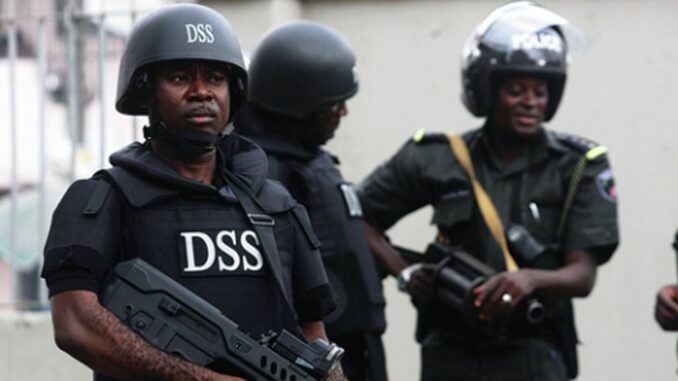
The public alert by the Department of State Services (DSS) to the effect that some people are fomenting religious crisis in the country is a frightening addition to the unenviable plight of a nation already under siege from various threats to internal security. As the primary agency responsible for domestic intelligence in Nigeria, the DSS needs to go beyond warning Nigerians and take proactive measures, using its paraphernalia of office, to fish out the culprits and bring them to book appropriately.
The agency lately alerted the public to ‘‘plans by some elements working with external forces to incite religious violence across the country.’’ ‘‘Part of the plans,’’ the organisation went on, is to cause inter-religious conflicts as well as use their foot soldiers to attack some worship centres, religious leaders, personalities, key and vulnerable points.
Coming from the DSS, this warning should be taken seriously by those in authority, and every citizen. While the DSS may be commended for its early detection of the alleged threat, it is nonetheless fulfilling precisely part of its job descriptions. Specifically, these include ‘‘prevention and detection of any crime against the internal security of Nigeria prevention, detection and investigation of threats of espionage, subversion, sabotage, terrorism, separatist agitations, inter-group conflicts, economic crimes of national security dimension and threat to law and order, Provision of timely advice to Government on all matters of National security interest…’’.
After raising the alarm, the DSS has, in popular parlance, also warned ‘‘those hatching these plots’’ to ‘‘desist from such in the interest of peace, security and development of the country.’’ Days after the agency brought its discovery to public knowledge, it has not supported it with details of so grave an allegation. It is grave because in this country of many religions and their sub- sects, religious groups are populated by not a few immature, unreflective and easily excitable minds who indeed have limited understanding of their faiths. As the national experience of the last few decades has shown, they constitute a danger to even their faith and respective adherents and also the larger polity.
The leading challenge this country faces is insecurity of lives and property. And a major contributor to this is religion-based insurgency driven by such well-known and active groups like Boko Haram, ISIS, and ISWAS. But there are also smaller, fundamentalist groups within society that may not wield guns and rocket launchers. Their extremist views are, nonetheless, sufficiently intolerant to threaten other citizens and endanger the country. Indeed, latent criminal tendencies – kidnapping, banditry, arson and murder are riding on the back of religion-driven insurgency so boldly.
It is noteworthy that, shortly after the DSS alerted Nigerians of its suspicion, a certain Muslim Solidarity Forum issued a veiled threat against the Bishop of Sokoto Diocese, The Most Reverend Mathew Kukah for exercising his inalienable and constitutionally guaranteed freedom of speech on urgent matters of national interest. The group accused the bishop of ‘‘attacking the image and reputation of Muslims,’’ demanded an ‘‘unreserved apology to the Muslim Ummah, or else he should quickly and quietly leave the seat of the Caliphate.’’
To order at will a bona fide, respectful and law-abiding citizen of this country out of the land by anyone without the legal powers to so do must amount to an offence under the law; so too, the threat inherent in the statement of the Muslim Solidarity Forum. Reasonably, the DSS should have invited the group leaders for an explanation of their pronouncement and the course of action they plan to take if Kukah does not meet their demand. Beyond that, the group’s statement was reckless enough to engender the threat about which the DSS had warned the nation.
The statement by the DSS on threats to national security is only the least of such alerts. In September 2019, the agency imputed to ‘‘unpatriotic and misguided activities’’ by ‘‘anti-social elements’’ who it said were engaged in ‘‘subversive objectives so as to achieve preferred illegal outcomes.’’ ‘‘The aim,’’ Dr. Peter Afunanya, the spokesman of the organisation, said, was ‘‘to set the country on fire as well as inflame passions across ethnic and religious divides with expected violent consequences.’’ Armed with intelligence, the DSS does not appear to move swiftly and decisively against suspects. Or if it does, its actions are not in the public domain.
The Nigerian public is alerted to threats posed by ‘‘anti-social elements’’ but it is not informed of the specific outcomes of the agency’s measures to protect that public. Who is arrested and on what allegation? This agency must manage its communication with Nigerians better.
The DSS is not alone in raising alarm on threats to national security. The Federal Government and state governors periodically do this. The Federal Government would accuse Amnesty International and the International Crimes Commission (ICC) of fueling insecurity in Nigeria, David Umahi of Ebonyi State would allege that desperate politicians collude with bandits; Bello Mutawalle of Zamfara State would accuse politicians of exploiting insecurity for personal gains. Even Ibrahim Magu, former head of the EFCC once alleged that some governors fuel insecurity to increase their security votes. Allegations are thrown into the public space rather frivolously, alarms are raised arbitrarily, but no evidence is presented to the public in support; no arrest is made of these criminal and unpatriotic elements, nor is anybody sanctioned.
Regrettably, the authorities in charge of this country must be reminded that their duty to the Nigerian people goes far beyond raising alarm, warning and lamenting. The constitutionally-assigned responsibility of constituted authorities at all levels, notably the DSS, is to detect danger, alert of it and nip it before it harms the populace. This is part of the intendments of Section 14 (2) (b) of the constitution. Surely, this is not too much for Nigerians to expect from the governments they elect.
END

Be the first to comment